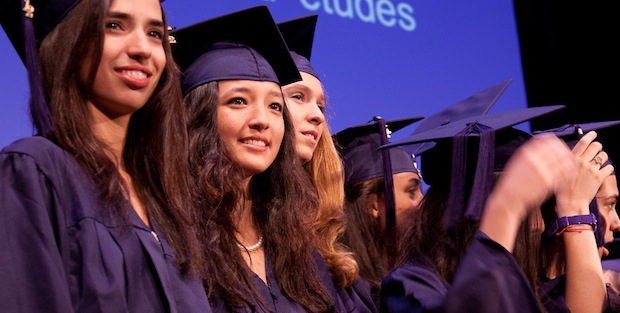Graduates from class of ’12.
Thursday, October 11. 8:17 AM. Lycée Louis le Grand. 5th arrondissement, Paris. I have arrived early for today’s meeting so that I can bask in the atmosphere of this room called the “grand parloir”, located off one of the many marble staircases in a school which was founded in the 16th century. The ceilings are unusually high and the elegant wooden floors creak under foot, as I imagine they have for 400 years.
A series of desks extend along all four sides of the room, covered in thick green felt, lending the space a candlelit aspect which I sense has been around since Louis XIV. To my right is a fireplace which may have warmed the atmosphere for such illustrious alumni as Voltaire, Hugo and Baudelaire. It is here that some 40 educational authorities and school officials will be gathering in less than three quarters of an hour to discuss one of the most exciting high school diplomas anywhere to be found.
Although I have attended this meeting on many other occasions, my delight in participating only grows with time. Every autumn, many of those engaged in advancing the cause of French-American collaboration in grade-school education come together to review and coordinate the bilingual, bicultural eleventh and twelfth grade program entitled the International Option of the French Baccalaureate (most often known by its acronym, the OIB).
Representatives from all parts of the world came to talk about the OIB
This morning, there will be representatives from the French Ministry of National Education and the Agency for French Education Outside of France (the AEFE), as well as representatives from the two American educational partners of the French government: the College Board and the Franco-American Commission. School administrators from France, the United States, South Africa, China and other countries around the globe where the OIB is offered will also be present. From past experience, I know the room will be full of inspiration.
Yet what is most on my mind is not, I confess, the day ahead. I am remembering the 48-hour trip our Director of College Counseling, Ms. Christine Pluta, and I took 10 days ago to four selective colleges in New England, the fourth such multi-university visit on which she and I have embarked in the past year. Our purpose has been to present the uniqueness of our school, a school that provides students in their final two years with a choice among three variations on the French Baccalaureate: the standard French Baccalaureate; the French-American Baccalaureate (or BFA); and the OIB.*
A 200 year-old diploma converges with American best practice
On each of these trips, Ms. Pluta and I have been struck by the deep respect which college officials express for the French educational tradition. At the same time, what universities hold in high esteem is the relationship which the 200 year-old French Baccalaureate has built with American best practice. As today’s meeting will attest once again, I think to myself with just a few minutes left before my colleagues arrive, the French Baccalaureate is at the cutting edge of bilingual, bicultural education around the world too. What an asset for our students!
*Approximately one quarter of our seniors complete the standard French Baccalaureate, one quarter take the BFA and one half complete the OIB. We consider all three programs to be equally valuable in preparing for college admission and devote much of 10th grade to ensuring we find the right match between each of our students and the French Baccalaureate possibilities on offer.
About the Author :
Sean Lynch was Head of School at the Lycée Français de New York from 2011 to 2018, after having spent 15 years at another French bilingual school outside of Paris: the Lycée International de St. Germain-en-Laye. Holding both French and American nationalities, educated in France (Sciences Po Paris) and the United States (Yale), and as the proud husband of a French-American spouse and father of two French-American daughters, Sean Lynch has spent his entire professional and personal life at the junction between the languages, cultures and educational systems of France and the United States. In addition to being passionate about education, he loves everything related to the mountains, particularly the Parc National du Mercantour.

